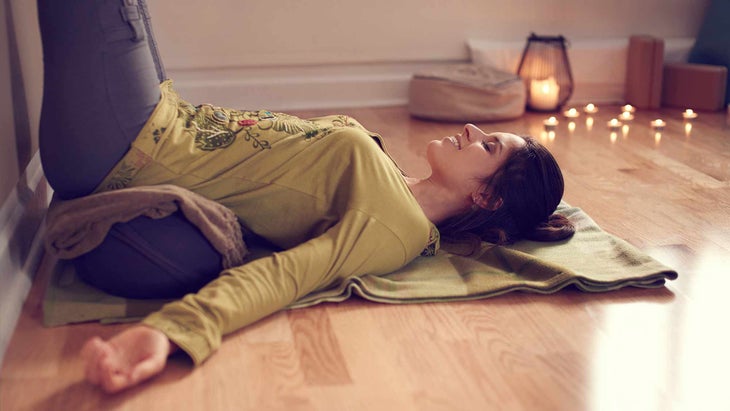Heading out the door? Read this article on the new Outside+ app available now on iOS devices for members! Download the app.
You may associate your daily yoga practice with stimulating stress relief, easing your anxieties or getting your daily exercise in, but now you may appreciate it in a new context—as a potential supplementary treatment for COVID-19.

In a recent review of more than 100 different scientific studies on yoga and immunity, researchers found evidence to suggest that meditation and yoga should be considered as potential adjunctive treatment options for COVID-19. Adjunctive treatments are remedies that supplement a primary treatment option, such as a drug or vaccine. As potential adjunctive treatments for COVID-19, yoga, meditation and pranayama practices could provide supplementary support to a future vaccine, should such a treatment become available, the study authors wrote in The Journal of Alternative and Complementary Medicine.
The researchers, led by William Bushell, PhD, a biophysical/medical anthropologist at the Massachusetts Institute of Technology, pointed to a body of scientific evidence that demonstrates the anti-stress and anti-inflammatory properties of such practices. Meditation and yoga increase a practitioner’s vagal tone, part of the body’s parasympathetic nervous system. The vagal tone regulates the body’s stress response, making them effective treatment options for stress-based trauma and inflammatory-based diseases.
See also This Yoga Sequence Will Reduce Stress and Boost Immunity
Bushell said adjunctive interventions that are categorized as behavioral, such as meditation or yoga, also have the potential to lower health care costs for patients. He said successful adjunctive treatments can make health care systems more effective and affordable.
Such an understanding of yoga and meditation as anti-inflammatory is not a new discovery. Bushell previously cited intensive forms of meditation and yoga as potential adjunctive interventions for other various infectious diseases, including Severe Acute Respiratory Syndrome (SARS) and malaria. His research relied on the demonstrated anti-stress and anti-inflammatory effects of these practices.
Bushell said that general scientific research on meditation and yoga correlated longer practices—both in terms of the length of the session and how often people practice—with a more positive result.
While the impact of yoga and meditation on treating COVID-19 is still unknown, some doctors have already implemented yogic sciences into their patient care practices.
See also Why More Western Doctors Are Now Prescribing Yoga Therapy
Writing for Psychology Today, Bushell and his co-authors, Eddie Stern and Maureen Seaberg, cite the recent decision of doctors to have COVID-19 patients become prone (lie on their stomachs) in order to free up lung space. Patients who were placed in such a position experienced dramatic increases in their blood oxygen levels. The potential of this maneuver, along with prone yoga positions is promising.
While none of these practices by themselves can provide a cure to COVID-19, further research will clarify the ways in which these modalities can be adjunctive treatments.
Get Started With These Practices
Self-Care Ritual: Pranayama
Add this breathing practice to your daily routine to de-stress, easy anxieties, and feel free.
A Five-Minute Meditation to Release Anxiety
Continue to release anxiety and focus on the present moment with this five-minute meditation.
Solar-Powered Yin Practice
Find relief in a healing, solar-powered yin practice.